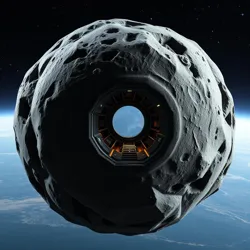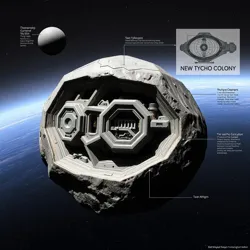New Tycho Colony
The New Tycho Colony was one of humanity's first attempts at establishing a permanent settlement within an asteroid, founded in 2145 by the Asteroid Colonization Initiative (ACI). Located in the main asteroid belt between Mars and Jupiter, the colony became notorious for its catastrophic failure and subsequent evacuation, leading to fundamental changes in space habitat design and safety protocols.
 The distinctive hexagonal habitat modules of New Tycho Colony, photographed shortly before the evacuation
The distinctive hexagonal habitat modules of New Tycho Colony, photographed shortly before the evacuationConstruction and Design
The colony was constructed within a hollowed-out section of the asteroid designated 2145-RT7, chosen for its relatively stable rotation and mineral-rich composition. The habitat consisted of three main interconnected modules:
-
The Primary Living Quarter (PLQ), housing residential and recreational facilities
-
The Resource Processing Center (RPC), dedicated to mining operations and material refinement
-
The Agricultural and Life Support Module (ALSM), containing hydroponic farms and atmospheric processing equipment
The Oxygen Crisis
Just eight months after achieving full operational status, New Tycho Colony experienced a catastrophic failure in its Biochemical Oxygen Generation System (BOGS). The failure was traced to a previously unknown bacterial contamination that compromised the colony's algae-based oxygen production system. All 47 colonists were safely evacuated thanks to the quick response of the Emergency Space Rescue Corps.
 Technical diagram showing the emergency evacuation protocols developed following the New Tycho incident
Technical diagram showing the emergency evacuation protocols developed following the New Tycho incidentLegacy and Impact
The New Tycho incident directly led to several crucial developments in space colonization technology and safety:
-
Implementation of the Triple-Redundant Life Support Protocols
-
Development of the Standardized Colony Safety Code
-
Creation of the Asteroid Settlement Review Board
Scientific Value
Despite its failure as a permanent settlement, New Tycho Colony provided valuable data for future asteroid colonization efforts. The colony's remains are still used today as a research site for studying long-term effects of human habitation in asteroid environments, managed by the Deep Space Research Institute.
See Also
- Asteroid Colonization Initiative
- Space Habitat Construction Standards
- Bacterial Contamination Protocols
- Emergency Colony Evacuation Procedures
References
- Journal of Asteroid Settlement Studies
- Deep Space Habitat Engineering Quarterly
- Chronicles of Early Space Colonization